1 citations,
June 2022 in “Photobiomodulation, photomedicine, and laser surgery” Photobiomodulation increases hair density in 5 weeks for androgenetic alopecia.
 1 citations,
May 2019 in “Bioactive compounds in health and disease”
1 citations,
May 2019 in “Bioactive compounds in health and disease” Certain vitamins, minerals, and foods like black raspberry extract and egg yolks can help reduce hair loss and promote hair growth.
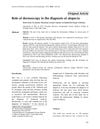 1 citations,
December 2018 in “Journal of Pakistan Association of Dermatology”
1 citations,
December 2018 in “Journal of Pakistan Association of Dermatology” Dermoscopy is useful for diagnosing different types of hair loss.
 1 citations,
May 2016 in “Current Opinion in Pediatrics”
1 citations,
May 2016 in “Current Opinion in Pediatrics” Children's hair loss can be caused by various factors and should be treated with appropriate, age-specific methods and psychological support.
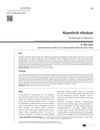 1 citations,
March 2014 in “Turkderm”
1 citations,
March 2014 in “Turkderm” Trichoscopy helps tell different hair loss types apart using specific scalp and hair patterns.
 December 2024 in “Journal of Biophotonics”
December 2024 in “Journal of Biophotonics” Dual wavelength LEDs may help reduce hair loss by lowering DHT levels.
 December 2024 in “Dermatological Reviews”
December 2024 in “Dermatological Reviews” New treatments for Alopecia Areata, like JAK inhibitors, are effective, and future research is exploring advanced therapies.
 September 2024 in “Archives of Dermatological Research”
September 2024 in “Archives of Dermatological Research” The light-guiding microneedle patch effectively stimulates hair growth in androgenetic alopecia without serious side effects.
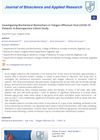 September 2024 in “Journal of Bioscience and Applied Research/Journal of Bioscience and Applied Research ”
September 2024 in “Journal of Bioscience and Applied Research/Journal of Bioscience and Applied Research ” COVID-19 can cause hair loss due to stress, with inflammation markers like D-dimer levels playing a role.
 September 2024 in “Journal of Clinical Medicine”
September 2024 in “Journal of Clinical Medicine” Permanent makeup can cause delayed allergic reactions, but they can be managed with proper treatment.
 July 2024 in “Dermatology and Therapy”
July 2024 in “Dermatology and Therapy” Darker hair colors may increase the risk of alopecia areata, while lighter hair colors may decrease it.
 April 2024 in “Pharmacognosy research”
April 2024 in “Pharmacognosy research” The herbal hair dye with natural ingredients like henna was successfully made and tested, but more research is needed on its effectiveness on different hair colors and benefits.
 February 2024 in “International journal of biology, pharmacy and allied sciences”
February 2024 in “International journal of biology, pharmacy and allied sciences” Plant-based treatments can effectively and safely treat hair loss.
 January 2024 in “Materials chemistry frontiers (Online)”
January 2024 in “Materials chemistry frontiers (Online)” New near-infrared OLED emitters are more efficient, especially platinum(II) complexes, and have promising applications like hair growth treatment.
October 2023 in “Asian journal of pharmaceutical and clinical research” Standardized data is essential for diagnosing scalp and hair conditions in males.
 August 2023 in “Natural Resources for Human Health”
August 2023 in “Natural Resources for Human Health” Vegetarians should take B vitamin supplements to avoid health issues.
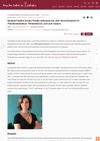 July 2023 in “Photobiomodulation, photomedicine, and laser surgery”
July 2023 in “Photobiomodulation, photomedicine, and laser surgery” Photobiomodulation increased hair count in men with hair loss after 5 weeks, with no further increase after 10 weeks.
 May 2023 in “Brazilian Journal of Animal and Environmental Research”
May 2023 in “Brazilian Journal of Animal and Environmental Research” Photobiomodulation effectively treats hair loss in dogs with black hair follicular dysplasia.

Combining dermoscopy and calcium fluorescent white staining improves diagnosis and treatment of hair fungal infections.
 January 2023 in “Dermatologic Therapy”
January 2023 in “Dermatologic Therapy” A new hand-held light therapy device was found to be safe and effective for treating mild-to-moderate acne.
 January 2023 in “International journal of sciences”
January 2023 in “International journal of sciences” Platelet-Rich Plasma therapy helped significantly in hair recovery for a hair loss condition after infection.
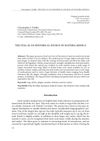 January 2023 in “Acta historiae medicinae stomatologiae pharmaciae medicinae veterinariae”
January 2023 in “Acta historiae medicinae stomatologiae pharmaciae medicinae veterinariae” Stag parts were historically used in medicine for various health issues.
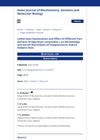 July 2022 in “Asian Journal of Biochemistry, Genetics and Molecular Biology”
July 2022 in “Asian Journal of Biochemistry, Genetics and Molecular Biology” Ageratum conyzoides may lower blood sugar and improve blood lipid levels in diabetic rats.

Low-level laser therapy is a safe, painless method that effectively treats acne and improves skin without post-treatment care.
 July 2021 in “IntechOpen eBooks”
July 2021 in “IntechOpen eBooks” Ginseng, especially its component ginsenosides, can promote hair growth, reduce hair loss, and potentially treat conditions like alopecia by affecting cell pathways and cytokines.
April 2021 in “Cermin Dunia Kedokteran” Two siblings with tinea capitis improved after treatment with ketoconazole.
January 2021 in “AIP conference proceedings” A hair serum made from coffee by-products can promote hair growth and is safe, but needs less stickiness.
 November 2020 in “Holistic Nursing Practice”
November 2020 in “Holistic Nursing Practice” COVID-19 can cause hair loss, loss of taste and smell, skin changes, and eye problems.
 July 2018 in “Journal of College of Medical Sciences-nepal”
July 2018 in “Journal of College of Medical Sciences-nepal” Women with certain types of hair loss may have low iron levels.
January 2018 in “Archives of dermatology and skin care” Low level laser therapy may promote hair growth for patterned hair loss, but more research is needed.
























